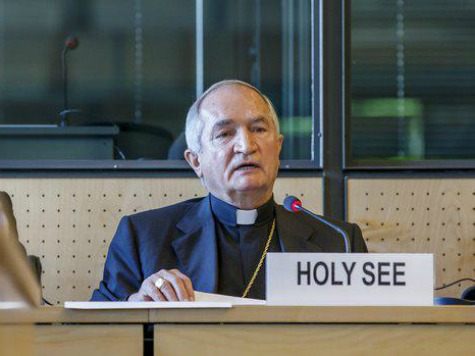Recent years have seen an increasing reluctance on the part of the Vatican to speak of the traditional “Just War Doctrine,” as Church officials have urged the exhaustion of diplomatic solutions before even considering the use of force. This reluctance seems now to be giving way to a grittier realism in the face of a relentless enemy with whom constructive, rational dialogue is impossible.
In 2003, then-Cardinal Joseph Ratzinger, the future Pope Benedict XVI, criticized the war in Iraq and went so far as to say that, given the power of new weapons to wreak destruction well beyond the combatant groups, “Today we should be asking ourselves if it is still licit to admit the very existence of a ‘just war.’”
Now, the Vatican representative to the United Nations in Geneva, Archbishop Silvano Tomasi, in what has been called “an unusually blunt endorsement of military action,” has recognized the need for the use of force in stopping the ongoing aggression of the Islamic State.
“We have to stop this kind of genocide,” the Archbishop said in a recent interview with the Catholic online journal Crux. “Otherwise we’ll be crying out in the future about why we didn’t so [sic] something, why we allowed such a terrible tragedy to happen.”
Last summer, Pope Francis acknowledged the legitimacy of the use of military force to halt the ISIS rampage, but he was quick to qualify its limits.
On the flight back to Rome from South Korea in August, reporters asked the Pope if he approved of U.S. airstrikes against Islamic State insurgents, to which he responded, “In these cases, where there is an unjust aggression I can only say that it is legitimate to stop the unjust aggressor.”
The Pope was careful, however, not to give the impression of a blanket endorsement of military strikes.
“I underscore the verb ‘to stop,’” he said. “I am not saying ‘bomb’ or ‘make war,’ but stop him (the aggressor). The means by which he can be stopped must be evaluated. Stopping the unjust aggressor is legitimate.”
In his recent interview, Archbishop Tomasi picked up on this theme, saying that the crisis wrought by Islamic militants requires “more coordinated protection, including the use of force to stop the hands of an aggressor.”
“It will be up [to] the United Nations and its member states, especially the Security Council, to determine the exact form of intervention necessary,” he said, “but some responsibility [to act] is clear.”
The Archbishop said that to be effective, an anti-ISIS coalition must include “the countries most directly involved in the Middle East,” suggesting the importance of enlisting the collaboration of the Islamic states of the region.
“What is needed is a coordinated and well-thought-out coalition to do everything possible to achieve a political settlement without violence,” Tomasi said, “but if that’s not possible, then the use of force will be necessary.”
The Catholic tradition of the “Just war theory” is generally attributed to the 5th-century Bishop Saint Augustine, whose ideas were built upon and codified by Saint Thomas Aquinas in the 13th-century. Aquinas laid out conditions by which war could be waged justly, including the proper authority, a just cause, and right intention.
Though slightly adapted, the Catholic Church continues to teach this tradition, and the 1992 Catholic Catechism endorses both the duty of self-defense and the moral tradition of just wars:
Legitimate defense–it says–can be not only a right but a grave duty for one who is responsible for the lives of others. The defense of the common good requires that an unjust aggressor be rendered unable to cause harm. For this reason, those who legitimately hold authority also have the right to use arms to repel aggressors against the civil community entrusted to their responsibility.
The four conditions laid out in the Catechism for the use of military force are these:
– the damage inflicted by the aggressor on the nation or community of nations must be lasting, grave, and certain;
– all other means of putting an end to it must have been shown to be impractical or ineffective;
– there must be serious prospects of success;
– the use of arms must not produce evils and disorders graver than the evil to be eliminated.
With these conditions in mind, it is easy to see why the Vatican believes that the use of force may now be necessary.
The Islamic State and its offshoots have been responsible for tens of thousands of deaths, the forced exile of hundreds of thousands of Christians and other minority groups, and the destruction of priceless historical and religious sites. The damage Islamic militants have caused and continue to cause is “lasting, grave, and certain,” and all other means of stopping them have proven to be absolutely futile.
Prospects of success will undoubtedly depend on the level of commitment shown by the United Nations, the United States and other Western powers, and their ability to procure the effective support of local nations who claim to oppose ISIS.
Follow Thomas D. Williams on Twitter @tdwilliamsrome.

COMMENTS
Please let us know if you're having issues with commenting.